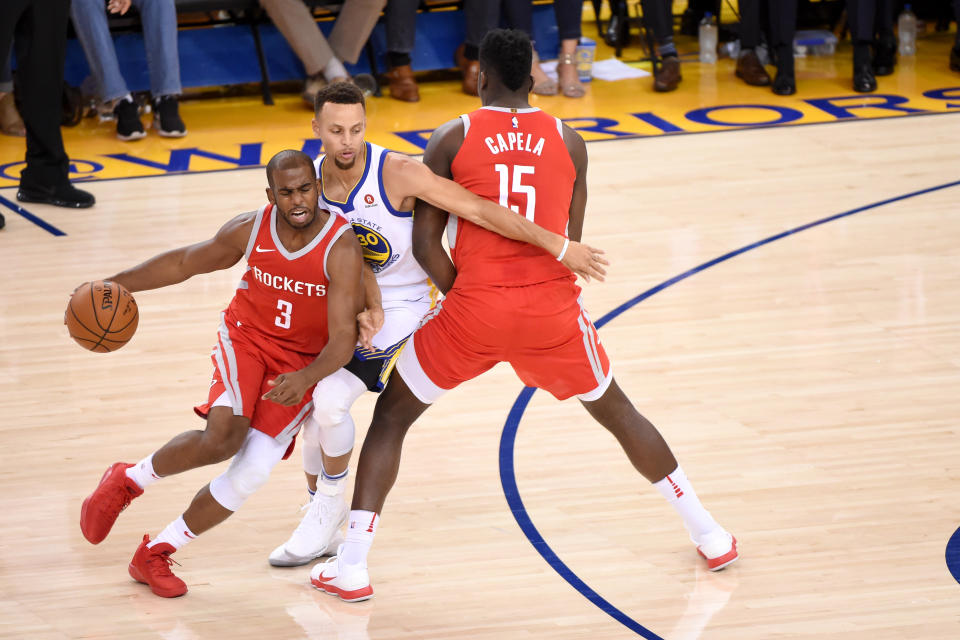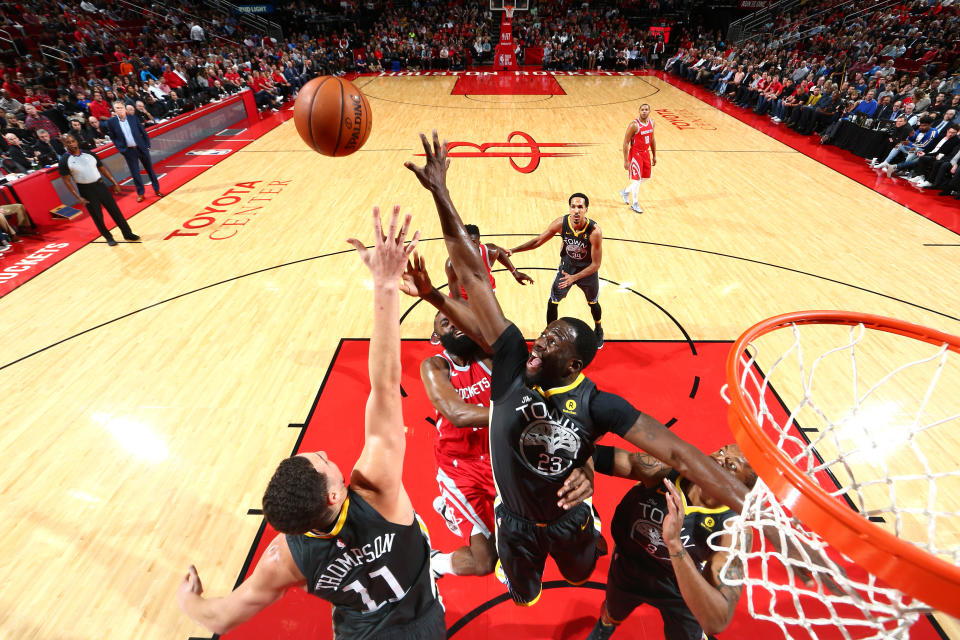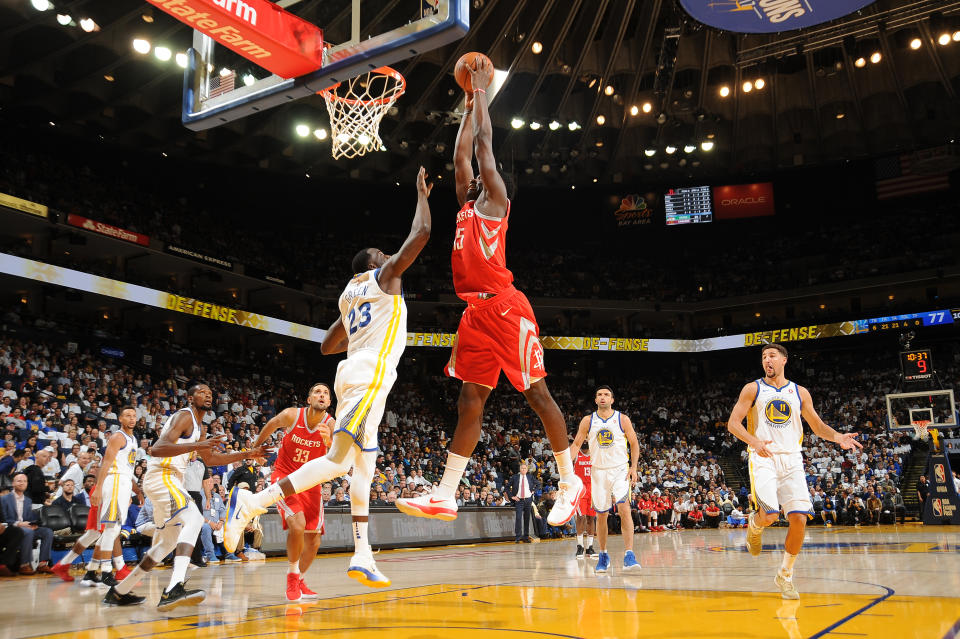Rockets vs. Warriors preview: The NBA's two best teams and their galaxy of stars square off

The Houston Rockets and Golden State Warriors will square off in the playoffs for the third time in four years, and in their second Western Conference finals matchup, starting Monday in Texas. Here are three pressing questions to consider as we get ready for the NBA’s two best teams to lock horns.
Who will be the best player in the series?
On one side: two former Most Valuable Players, an all-time sharpshooter with a knack for coming up big when it matters most, and one of the most versatile defensive weapons of his generation. On the other: this year’s presumptive MVP, a playmaking legend fresh off the best postseason performance of his career, and the very definition of a model pace-and-space center, just coming into his own. Man, this is one blockbuster-ass series.
From the moment the ball went up in October, nobody has played at an elite level more consistently than James Harden. The two-time MVP runner-up elevated his game, leading the NBA in scoring and finishing third in assists, using the league’s highest share of his team’s offensive possessions while still generating buckets more efficiently than he has since he was a third option. He has become the sport’s most deadly isolation scorer, an assassin when he draws defenders into deep water in single coverage, delivering dagger after dagger with his nigh-on-unstoppable step-back.
Even against the best, Harden can tilt games by himself. (Recall Games 1 and 3 against Minnesota, and Game 1 against Utah.) But he’s coming off two straight quiet contests, shooting 15-for-44 from the field and 2-for-14 from 3-point range with 11 turnovers against seven assists in the Rockets’ last two wins over the Jazz. On one hand, maybe getting to attack a defense without Rudy Gobert at its heart helps thaw the freeze. On the other, attacking one with Klay Thompson up top and Draymond Green behind him doesn’t sound like much fun, either.
The Rockets don’t have any ideal defenders for Kevin Durant, chiefly because no such weapon can be said to truly exist, but they’ve got some dudes with the length, smarts, chops and snarl to give it a go. Trevor Ariza and Luc Mbah a Moute will each get their crack at it. So will perpetually vexed fire hydrant P.J. Tucker — who actually saw more of the matchup than any other Rocket during the regular season, helping limit Golden State to 30 points on 32 possessions during which he logged the most time checking KD — and a slew of other defenders whose numbers come up in the Rockets’ switch-everything scheme.
Each of those defenders can offer Durant a different defensive challenge: the core strength of Tucker, Harden and Eric Gordon, the swarming arms of Ariza, Mbah a Moute and Clint Capela, the sheer pestering and aggressiveness of Chris Paul. Ultimately, though, there’s only so much any individual defender can do to knock the scoring savant off his square and bother his shot. If KD hits them more often than not — he’s at 49.3 percent from the field in the playoffs, and went 25-for-45 in Games 4 and 5 against New Orleans — the Rockets will be in trouble.

Even amid the rest of the star power in this series, so many eyes will be on Paul. He is, famously, making his first trip to the third round of the playoffs, and stands as the defining new addition to this rivalry, the piece Daryl Morey took a home-run swing to import in pursuit of his and Houston’s unrelenting obsession. The future Hall of Famer averaged a shade under 22 points, nine rebounds and nine assists per game in three appearances against Golden State this year. That includes the opening night win at Oracle Arena in which he was “playing on one leg” with a knee injury that knocked him out for the final five minutes of his first game as a Rocket, and for a month after that.
Paul will guard Stephen Curry, and for all CP3’s All-Defensive Team selections, we know that’s a matchup Curry can win. Golden State scored 70 points on the 48 possessions when Paul guarded Steph this season, a rate of offensive efficiency (145.8 points-per-100) that’s basically an imaginary number. But Curry will also guard Paul, and while the Warriors fared better on that score during the regular season (68 points in 70 trips, a rate far below Houston’s full-season mark), it’s an arena in which CP3 can make a major impact, putting Steph through the pick-and-roll wringer and forcing him to take hits, pick up fouls and expend energy on defense in hopes of limiting his ability to make magic on the other end.
How effective Paul — and Harden, who hunted Curry in isolation late in the two teams’ last meeting, which Houston won — can be in that role could be the bellwether of the series. Ultimately, for Golden State, everything always comes back to Steph: his ability to stretch opposing defenses past their breaking points with his limitless range and unerring accuracy, his gift for collapsing defenses off the dribble to create shots for others, the off-ball movement that demands constant defensive attention, and yes, his capacity for holding up well enough on defense that Steve Kerr can trust his team won’t give up more points than it scores when going small.
By the time Game 1 tips off, Curry will be two weeks removed from his return to the Warriors lineup following five weeks on the shelf with a sprained medial collateral ligament in his left knee. He was plenty productive against New Orleans, averaging 24.5 points, 5.3 rebounds and 3.5 assists in 31.2 minutes per game, shooting 47.8 percent from the field and 44.1 percent from the 3-point line. But he also had moments where he didn’t quite look like his explosive self when it was time to create separation from an on-ball defender or attack a switch.
If there are any lingering ill-effects from that MCL sprain — which the Warriors clearly don’t believe, or else they wouldn’t have played Steph 37 minutes in the closeout Game 5 — the impact could show up most significantly on the defensive end. You’d best believe Paul, Harden, Gordon and the rest of the isolation-loving Rockets will do their damnedest to make Curry prove he’s in full form and up to the task. If he is, the Warriors will go to their fourth straight NBA Finals. If Houston can get him to start to buckle, Golden State might, too.

Which team’s better equipped to get stops?
In a matchup between two of the NBA’s most explosive offenses, neither side’s going to just shut down the other. But finding a way to short-circuit the opposing juggernaut just enough will be vital to tilting the run of play.
The Rockets actually topped the Warriors in defensive efficiency during the regular season, finishing sixth in points allowed per possession, while a Golden State team that largely seemed to be on cruise control late in the season landed ninth. But while the Rockets have maintained their defensive form in the postseason, limiting Minnesota and Utah to just 102.1 points per 100 possessions, the Warriors have flipped the proverbial switch and clamped down like they mean it, holding the Spurs and Pelicans to a microscopic 99.3 points-per-100, the postseason’s best mark.
The regular season doesn’t offer much usable intel as to how Houston would prefer to match up defensively against the Warriors. The Rockets’ three most frequently used five-man lineups against Golden State all featured Ryan Anderson, who has been all but excised from Mike D’Antoni’s rotation and who’s unlikely to play meaningful minutes against a Warriors offense that will relentlessly target him in the pick-and-roll whenever possible. But as noted by NBA.com’s John Schuhmann, the Rockets’ starting lineup — Harden and Paul in the backcourt, Ariza and Tucker up front, Capela in the middle — has been a meat-grinder through two rounds.
Houston’s starters limited Minnesota and Utah to just 92.3 points-per-100 while swarming all over the court to force a whopping 21.1 turnovers per 100 possessions. The Rockets have spent all season practicing and perfecting their switch-everything approach for this moment, knowing that dealing with the Warriors’ free-flowing pass-and-cut offense will require five-men-on-a-string defense performed by players with the requisite gifts to contest everything and concede nothing to an offense that’s broken the best in the business over the past four years.
The Warriors gave up 111.8 points per 100 possessions in three regular-season games against Houston, a massive number. It’s worth noting, though, that two of those games came without key defender Andre Iguodala in the lineup. He’s back now, and playing at what appears to be both 100 percent investment and as-close-as-the-34-year-old-gets to 100 percent health. That matters, because it’s allowed Kerr to go to his trump card — the “Hamptons Five” lineup of Green, Durant, Iguodala, Thompson and Curry — for extended minutes.

That supercharged version of Golden State’s “death lineup” looked awfully fearsome against New Orleans, outscoring the Pelicans by 54 points in 54 minutes while limiting Anthony Davis and company to just 86.6 points-per-100, which would’ve been dead last in the NBA in offensive efficiency by several nautical miles. This is a lineup that impedes passing lanes, switches with flair and fervor, contests everything, disrupts flow, creates turnovers, starts fast breaks, and brings the house down on your head. It is also a lineup that didn’t see a single second of floor time against the Rockets during the regular season. How Houston handles it could be the single most important determining factor in this series.
For that matter, how Golden State adjusts to an uptick in minutes for that lineup — and specifically its shift to the beginning of the first and third quarters — will be critical, too. Danny Leroux of The Athletic did an excellent job of breaking down the impact of the shift on the Warriors’ rotation, which could create opportunities for Harden, Paul and Gordon to get cooking against lineups where Green’s not on the floor to direct traffic from the back line.
Gordon’s a major looming X-factor in this series. He can create his own shot, knock down looks created by others, get to the line and defend multiple positions, a potential star coming off the bench and reigning Sixth Man of the Year. But he’s also a streaky sort who shot just 34 percent from the field and 33.3 percent from the 3-point line against Utah. The Rockets need him to shake off that cold snap in a hurry to give Golden State more questions to answer.
Can Capela hold up when the Warriors go all-small?
From the start of their first training camp together, D’Antoni told the Rockets’ promising young center exactly what he wanted.
“Protect the rim, run the floor, set a pick, roll to the basket — oh, it didn’t work — go back, set another pick and do it over again,” D’Antoni said, according to Lee Jenkins of Sports Illustrated. “I’m going to yell at you, but if we win a championship, you’ll be the reason.”
Well, here goes nothing. After two rounds of praiseworthy performance against All-Star scorer Karl-Anthony Towns and Defensive Player of the Year favorite Gobert, Capela will now have to hold up against an opponent that’ll force him to look down.

The Warriors are going to go small, putting the 6-foot-7 Green at center, completely confident in the four years of proof that this configuration renders them virtually unstoppable with the ball while retaining the defensive spine to unmoor opposing offenses. This would also seem like an opportune time for Kerr to dust off rookie Jordan Bell, an athletic and switchable four/five whose first season was derailed by a severe ankle injury in January, and who has yet to log double-digit minutes in the playoffs. Ditto for the Durant-at-center look, which was a monster for Golden State in last year’s Finals, but which Kerr has largely kept under wraps this season.
The Warriors will have their not-quite-bigs set screen after screen, looking to get Capela switched onto the likes of Curry and Durant, or trying to track Thompson off the ball. The goals: pull Houston’s best shot-blocker away from the rim, and force the 6-foot-11 Swiss national to keep up with Golden State’s top scoring threats in space. With remarkable agility for his size, a 7-foot-4-1/2-inch wingspan and an ever-advancing understanding of how best to position himself, Capela’s got the tools to hang in there with every feint, crossover and lateral move. Even so, the Warriors will force him to prove he can do it, time and time again, in the most pressure-packed environment of his career.
If he falters, D’Antoni will have to go smaller than even he typically feels comfortable doing. No Rockets lineup featuring Paul and Harden without a center — Capela, primary backup Nene, converted power forward Anderson, or any of Houston’s deep bench reserves — has logged more than 30 minutes this season, according to NBAwowy.com’s data. The most common of those short-minute small-ball options featured some combination of Harden, Paul, Gordon, Ariza, Mbah a Moute and Tucker — nobody taller than 6-foot-8, with Tucker in the ostensible Draymond role as a 6-foot-6 muscle-and-grit “center.”
If Capela can’t hang, these lineups likely represent Houston’s best bet at finding the mix of firepower (Ariza, Mbah a Moute and Tucker all shot 36 percent from 3 or better this season, with Tucker a scorching 22-for-48 in the playoffs) and defensive acumen (lineups featuring the Ariza-Mbah a Moute-Tucker trio have allowed just 99.8 points-per-100 in 224 minutes) to go toe-to-toe with the Hamptons Five. The best version of these Rockets, though, has Capela screening to set Harden and Paul free, rolling to the rim to suck in defenders, attacking the offensive glass to extend possessions and patrolling the paint to deter would-be drivers. If the Warriors can run him off the floor, the Rockets as a whole might soon follow.
Prediction: Warriors in 6.
More NBA coverage:
– – – – – – –
Dan Devine is a writer and editor for Yahoo Sports. Have a tip? Email him at devine@oath.com or follow him on Twitter!
More from Yahoo Sports:
• Terez Paylor: Jets rookie’s unlikely journey from bouncer to the NFL
• Jerry Jones hurt Dez Bryant, but he doesn’t think it matters
• MLS team about to make $16M mistake with Wayne Rooney
• Did video game obsession lead to pitcher’s injury?


